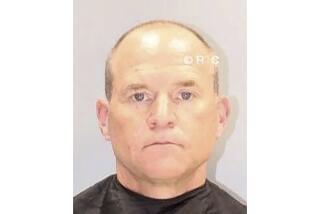McDougal Trades Whitewater Details for Short Sentence
- Share via
LITTLE ROCK, Ark. — Whitewater conspirator James B. McDougal had his prison term trimmed to just three years on Monday in exchange for providing independent counsel Kenneth W. Starr with new details about President Clinton’s alleged involvement in a plot to defraud the government.
U.S. District Judge George Howard imposed what prosecutors viewed as a light sentence in response to assurances from Starr that McDougal, who was convicted of 18 counts of conspiracy and fraud, had volunteered “new and important information” about the case. McDougal and two other defendants were found guilty last year of bilking the government of millions of dollars. (McDougal could have gotten up to 84 years in prison on all counts.)
Starr did not publicly disclose the evidence supplied by McDougal. But sources close to the prosecution said he told the independent counsel that Clinton lied under oath last year when the president denied attending a mid-1980s meeting that was central to the alleged Whitewater conspiracy. McDougal’s assertion contradicts his earlier testimony in the case.
In an interview taped after his sentencing Monday and scheduled to air tonight on “Dateline NBC,” McDougal said he had grown “sick and tired of lying” for the president, and that Clinton had, in fact, attended the controversial meeting.
McDougal vaguely acknowledged that the new information he provided does not bode well for the president. Asked after the sentencing hearing if he stands by his statement of several years ago that the president and First Lady Hillary Rodham Clinton would be proved blameless in the Whitewater scandal, he replied: “I wouldn’t go to the bank on that.”
The evidence supplied by McDougal is certain to be made public when Starr issues his final report on the Whitewater case, or perhaps sooner if the independent counsel uses it to bring charges against additional defendants. But there is no indication whether Starr is planning to use the information to charge the president, first lady or anyone else.
Even a reduced three-year prison term is a humbling outcome for McDougal, 56, who in the words of his lawyer, Sam Huer, “has gone from the very top to the very bottom.” Now penniless and living in a rented trailer in Arkadelphia, Ark., McDougal once served as top aide to the late Sen. J. William Fulbright and ran a multimillion-dollar savings and loan in Little Rock.
A jury found he had improperly siphoned money from the thrift to create an unsuccessful residential real estate empire. Whitewater, a resort community in the Ozarks that the McDougals and Clintons founded together in the late 1970s, was one of his many failed projects.
In trial testimony, both the president and McDougal staunchly denied a statement by the government’s star witness, David Hale, that then-Gov. Clinton had attended a 1986 meeting at a land office south of Little Rock. During the meeting, Hale agreed to make an improper $300,000 loan from his government-backed small business investment corporation to McDougal’s wife. Some of the loan money later passed through the Whitewater checking account.
Although McDougal is known to have changed his testimony on this important point, prosecutors admit they cannot bring perjury charges against the president based solely on McDougal’s testimony. Defense lawyers would certainly challenge his credibility based on his previous testimony.
In his interview with NBC Monday, McDougal admitted changing his story, saying he was “trying [his] best to protect” the president. McDougal also acknowledged his credibility problem, telling interviewer Stone Phillips he had “every right to be suspicious and to think perhaps” that he was only trying to get a shorter prison term. But, he added, his latest account is “very well documented.”
Starr told Howard that McDougal, who has been cooperating with the prosecutors since August, also led the independent counsel to documents and witnesses that independently corroborate McDougal’s account of many events. But it is not known whether Starr has found any corroboration to support testimony placing Clinton at the meeting in question.
McDougal had been facing a potential maximum jail sentence of 84 years for his conviction last May, although he was never expected to get the maximum. His plea for leniency was based on claims that he is sorry for his crimes and is suffering from poor health.
“I take full and complete responsibility for my crimes and misdeeds,” McDougal told the court. “I’ve embarrassed the people in my community. I don’t know how I can ever make amends to them for their goodness and their trust. All I have is to ask humbly for their mercy.”
The sentence calls for McDougal to serve up to three years in a prison medical facility followed by three years’ probation, to pay a $10,000 fine and a $900 special fee and to make restitution of more than $4.27 million defrauded from the Small Business Administration and the Federal Deposit Insurance Corp., if possible.
He will be required to go to prison on June 16 unless he can persuade Howard that he has sufficient grounds to appeal the sentence. Because his crimes preceded the current sentencing guidelines used by federal courts, lawyers said he is likely to win release after serving just 18 months.
Starr, in a rare courtroom appearance, was effusive in his praise for McDougal’s diligence in providing information to the independent counsel’s office.
Starr’s kind words were designed not only to persuade Howard to grant leniency for McDougal, but also to persuade McDougal’s two co-defendants--his ex-wife, Susan, and former Arkansas Gov. Jim Guy Tucker--to cooperate with the prosecution as well.
Susan McDougal is serving a two-year jail sentence for contempt of court for failing to testify to a grand jury in response to a subpoena from Starr. She also must serve two years for her conviction in this case, and is awaiting trial in Santa Monica, beginning May 6, on charges that she stole $150,000 while working for conductor Zubin Mehta.
Tucker is serving a four-year sentence under “house arrest” at his home in Little Rock. He was not required to go to jail because of his health, having recently undergone a liver transplant.
McDougal, who accepted his sentence with uncharacteristic calmness and humility, had been hoping that his cooperation--combined with his physical ailments--would win him a “house arrest” sentence as well. His physician, Noland Hagood, testified during the hearing that a prison term might threaten McDougal’s life by exacerbating his twin ailments: manic depression and vascular disease.
But Howard ruled that it was important for McDougal to serve a prison term to demonstrate to others the consequences of his criminal acts. “It will take Mr. McDougal out of circulation for a reasonable period of time,” the judge said.
More to Read
Sign up for Essential California
The most important California stories and recommendations in your inbox every morning.
You may occasionally receive promotional content from the Los Angeles Times.










